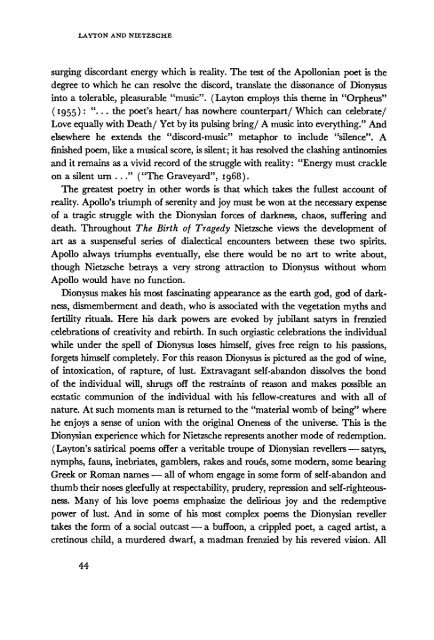LAYTON AND NIETZSCHE
LAYTON AND NIETZSCHE
LAYTON AND NIETZSCHE
Create successful ePaper yourself
Turn your PDF publications into a flip-book with our unique Google optimized e-Paper software.
<strong>LAYTON</strong> <strong>AND</strong> <strong>NIETZSCHE</strong><br />
surging discordant energy which is reality. The test of the Apollonian poet is the<br />
degree to which he can resolve the discord, translate the dissonance of Dionysus<br />
into a tolerable, pleasurable "music". (Layton employs this theme in "Orpheus"<br />
( I 955) : "· · · th e poet's heart/ has nowhere counterpart/ Which can celebrate/<br />
Love equally with Death/ Yet by its pulsing bring/ A music into everything." And<br />
elsewhere he extends the "discord-music" metaphor to include "silence". A<br />
finished poem, like a musical score, is silent; it has resolved the clashing antinomies<br />
and it remains as a vivid record of the struggle with reality : "Energy must crackle<br />
on a silent urn ..." ("The Graveyard", 1968).<br />
The greatest poetry in other words is that which takes the fullest account of<br />
reality. Apollo's triumph of serenity and joy must be won at the necessary expense<br />
of a tragic struggle with the Dionysian forces of darkness, chaos, suffering and<br />
death. Throughout The Birth of Tragedy Nietzsche views the development of<br />
art as a suspenseful series of dialectical encounters between these two spirits.<br />
Apollo always triumphs eventually, eke there would be no art to write about,<br />
though Nietzsche betrays a very strong attraction to Dionysus without whom<br />
Apollo would have no function.<br />
Dionysus makes his most fascinating appearance as the earth god, god of darkness,<br />
dismemberment and death, who is associated with the vegetation myths and<br />
fertility rituals. Here his dark powers are evoked by jubilant satyrs in frenzied<br />
celebrations of creativity and rebirth. In such orgiastic celebrations the individual<br />
while under the spell of Dionysus loses himself, gives free reign to his passions,<br />
forgets himself completely. For this reason Dionysus is pictured as the god of wine,<br />
of intoxication, of rapture, of lust. Extravagant self-abandon dissolves the bond<br />
of the individual will, shrugs off the restraints of reason and makes possible an<br />
ecstatic communion of the individual with his fellow-creatures and with all of<br />
nature. At such moments man is returned to the "material womb of being" where<br />
he enjoys a sense of union with the original Oneness of the universe. This is the<br />
Dionysian experience which for Nietzsche represents another mode of redemption.<br />
(Layton's satirical poems offer a veritable troupe of Dionysian revellers — satyrs,<br />
nymphs, fauns, inebriates, gamblers, rakes and roués, some modern, some bearing<br />
Greek or Roman names — all of whom engage in some form of self-abandon and<br />
thumb their noses gleefully at respectability, prudery, repression and self-righteousness.<br />
Many of his love poems emphasize the delirious joy and the redemptive<br />
power of lust. And in some of his most complex poems the Dionysian reveller<br />
takes the form of a social outcast — a buffoon, a crippled poet, a caged artist, a<br />
cretinous child, a murdered dwarf, a madman frenzied by his revered vision. All<br />
44

















